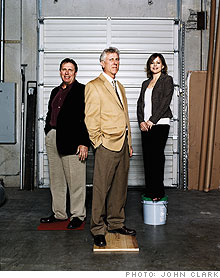Floored by growth
An installer of carpeting and tile struggles to manage his booming business.
 |
| Division 9's owners (from left): Mike Quinton, Chuck Young, and Melissa Boggan |
 |
| Divison 9 needs to quickly find a cheap way to finance the flooring it installs. |



SEATTLE (Fortune Small Business) -- It's a rare sunny day in Seattle, and the skyline is dotted with construction cranes. At many of those building sites, Division 9 Flooring will install carpet, tile, or hardwood floors.
Chuck Young, 43, started his company in 2002. His clients rave about Division 9's honesty and customer service - qualities that have helped the firm thrive. Since its founding, sales have doubled almost every year, putting Division 9 at $15 million in revenues for 2007.
That growth, however, is causing problems.
"I started as an installer," says Young. "I don't have experience running a multimillion-dollar business."
A year after launching, Young brought in his uncle Mike Quinton, 50, who owns 40% of the partnership. Both Young and Quinton focus on sales and on managing the 15 to 25 contract installers who typically work for the firm on any given day. Last year the team added another partner, CFO Melissa Boggan, 28, who owns 20% of the business. Boggan handles human resources and backroom tasks such as billing.
Although residential construction is slowing in the region, commercial work keeps the company busy.
"Growth is good," Young admits. "But we need to balance it with cash flow."
Because business clients don't pay for materials until after they arrive in Division 9's warehouse, in this tight credit market the firm often has trouble financing these large purchases.
Fast growth has also highlighted leadership issues.
"We used to have a real family atmosphere," Young says. But the firm has been on a hiring binge. Now some of its 28 employees complain of being ignored and uninformed.
Young also frets about communication issues among the three owners. They meet regularly but acknowledge they sometimes lose track of who is in charge of what, and they don't follow through on tasks they've agreed to handle.
To tackle these issues, we brought in three consultants. They toured the company's Woodinville, Wash., warehouse and office, and then headed to a nearby hotel conference room to hammer out solutions.
The first to speak up is John Armour, a CPA and construction consultant with CBIZ in Denver.
"I've seen people with your talent sell themselves out of business because they can't deliver or finance deals," he says.
Around the table, heads nod. Division 9 eases its cash-flow woes by buying materials for big jobs with bank debt. Armour disapproves.
Arguing that there is a better way, Armour hands out copies of a report that compares Division 9 with similar contractors. He explains that the company's bank-debt-to-equity ratio is 2.2 to 1. Comparable contractors don't carry that amount of debt (industry standards, says Armour, dictate that this ratio be no higher than 1.2 to 1).
"Where else can you get the money?" Armour asks.
"The customer!" Boggan realizes. Armour nods.
Young and Quinton are unsure.
They note that their residential clients routinely pay 50% of material and labor costs upfront, but business clients typically don't pay for labor beforehand and pay for materials only once they arrive.
Armour says most other contractors get deposits from business clients. This arrangement is set out in the contracts they use, which provide that the contractor can bill for materials in full before they are received. The three partners look as if someone had just handed them hefty cash bonuses.
But there's more.
"Your competitors also overbill," Armour says. "Put your markup on the materials invoice pre-installation, and get your profit upfront."
Quinton worries that clients might balk. Armour suggests Division 9 simply decline the job if they do.
-
The Cheesecake Factory created smaller portions to survive the downturn. Play
-
A breeder of award-winning marijuana seeds is following the money and heading to the U.S. More
-
Most small businesses die within five years, but Amish businesses have a survival rate north of 90%. More
-
The 10 most popular franchise brands over the past decade -- and their failure rates. More
-
These firms are the last left in America making iconic products now in their twilight. More









